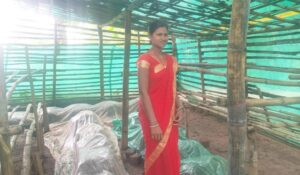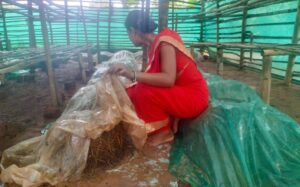Mushroom growing substantiates livelihood@udanguda
 In the remote areas of Kosagumuda Block in Nabarangpur District, there is a village called Udanguda in the Motigaon Gram Panchayath. With 40 households, due to a lack of knowledge about other livelihood opportunities, they have relied solely on agriculture. However, because there is no proper irrigation facility, they can only harvest one crop per year. During the non-farming season, they turn to Non-Timber Forest Products (NTFP) to earn a living. Sustainable livelihood generation has been a major problem in villages like Udanguda. The lack of education and awareness about diversifying livelihood opportunities has made it difficult for these people to meet their basic needs. To help them earn a stable and profitable living, CYSD has launched the South Odisha Livelihood Program. Under this initiative, the people of Udangudi have been introduced to mushroom cultivation. Three women Self-Help Groups (SHGs) from the village have been identified and provided with training in mushroom cultivation through a collaborative approach with NABARD.
In the remote areas of Kosagumuda Block in Nabarangpur District, there is a village called Udanguda in the Motigaon Gram Panchayath. With 40 households, due to a lack of knowledge about other livelihood opportunities, they have relied solely on agriculture. However, because there is no proper irrigation facility, they can only harvest one crop per year. During the non-farming season, they turn to Non-Timber Forest Products (NTFP) to earn a living. Sustainable livelihood generation has been a major problem in villages like Udanguda. The lack of education and awareness about diversifying livelihood opportunities has made it difficult for these people to meet their basic needs. To help them earn a stable and profitable living, CYSD has launched the South Odisha Livelihood Program. Under this initiative, the people of Udangudi have been introduced to mushroom cultivation. Three women Self-Help Groups (SHGs) from the village have been identified and provided with training in mushroom cultivation through a collaborative approach with NABARD.
However, this intervention faced its own set of challenges. “Getting people to adapt to mushroom cultivation wasn’t easy,” shared Khagesh Bhatra, the Community Resource Person of Udanguda. Initially, when the training program was launched, only eight women participated. This was primarily due to a lack of awareness and knowledge about mushrooms and how to cultivate them. Even those who were enthusiastic initially encountered difficulties in grasping the mushroom cultivation process.
Gradually, however, these SHG members have gained a better understanding of the process and have begun to turn a profit. Witnessing the low investment and high-income potential, more women started attending the training program.
 At present, 30 women from three SHGs have embarked on mushroom cultivation and are earning a very profitable source of income. Instead of relying on NTFPs during the non-agricultural seasons, these women farmers are now making a significant contribution to their household income, averaging around ₹14,000 annually. Each of these three Self-Help Groups consists of 10 members. Over the past seven months, each member has set up between 25 to 30 straw beds for mushroom cultivation. Depending on the type of mushroom being cultivated, each of these beds can yield 2 to 3 harvests. Every harvest typically produces mushrooms with a total weight of around 1 kilogram. In the market, each kilogram of mushrooms is valued at approximately ₹270 to ₹300. Considering the investment required to prepare the straw and procure the spawns for 30 beds, which amounts to ₹1,800, the returns are usually 9 to 10 times higher than the initial investment.
At present, 30 women from three SHGs have embarked on mushroom cultivation and are earning a very profitable source of income. Instead of relying on NTFPs during the non-agricultural seasons, these women farmers are now making a significant contribution to their household income, averaging around ₹14,000 annually. Each of these three Self-Help Groups consists of 10 members. Over the past seven months, each member has set up between 25 to 30 straw beds for mushroom cultivation. Depending on the type of mushroom being cultivated, each of these beds can yield 2 to 3 harvests. Every harvest typically produces mushrooms with a total weight of around 1 kilogram. In the market, each kilogram of mushrooms is valued at approximately ₹270 to ₹300. Considering the investment required to prepare the straw and procure the spawns for 30 beds, which amounts to ₹1,800, the returns are usually 9 to 10 times higher than the initial investment.
